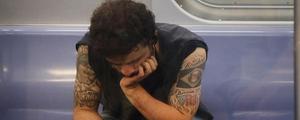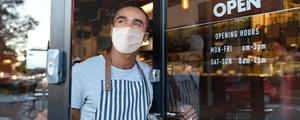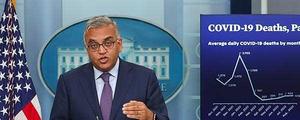Story Highlights
- 30% say coronavirus situation is worsening; 27% worry about being infected
- Both rates are up from last quarter but still well below pandemic highs
- No commensurate decrease in sense of normalcy returning to life
WASHINGTON, D.C. -- Perhaps reflecting the rise in COVID-19 infections and new variants emerging over the summer, Americans have become less confident about the direction in which the coronavirus situation is going and are slightly less likely to believe the pandemic is over. They have also grown a bit more concerned about their own chances of being infected.
Even so, people remain positive on balance and haven’t lost optimism that their lives are returning to normal.
These findings are from the latest quarterly update of Gallup’s COVID-19 tracking poll, based on interviews with over 5,000 U.S. adults and conducted Aug. 29-Sept. 5 via Gallup's probability-based web panel.
One in Four See Situation Worsening, Worried About Infection
Thirty percent of Americans now say the pandemic is getting worse. This is up sharply from 5% in Gallup’s prior measure in late May/early June, and 8% in February, and is the highest rate of pessimism about the pandemic measured in over a year, since July 2022. Pessimism still isn’t close to the overwhelmingly negative outlook seen in 2020, however, when as many as 73% said the pandemic was worsening.
As has been the case consistently since the start of 2022, the largest share of adults, currently 41%, believe the coronavirus situation is improving, while a steady 30% say it’s staying the same.
About one in four Americans also now say they are either “very” (4%) or “somewhat” (23%) worried that they will get the coronavirus, while 36% are “not too worried” and 37% “not worried at all.”
The 27% worried at least somewhat is up from 18% in May/June but is essentially back to where it was in February. It is also less than half the peak level of worry recorded during the pandemic in 2020, when as many as 59% were worried.
Slimmer Majority Believes Pandemic Is Over
While fewer Americans today than last quarter believe the pandemic is over, the majority (53%) still say it is. This is down from 64% in May/June but remains slightly higher than the 49% recorded in February. All of these readings are higher than Gallup found in 2021 or 2022.
Americans’ Sense of Normalcy Undaunted by Latest Infection Wave
Meanwhile, there has also been no backslide in Americans’ reports of normalcy. With 42% saying their life is completely back to normal, there is still much room for this to grow, but the current percentage is unchanged from June.
An equal proportion, also steady, say their life is somewhat back to normal (43%), while 15% say it is not yet back to normal.
Heightened COVID-19 Concerns Concentrated Among Democrats
All party groups are more likely now than in May/June to say the coronavirus situation is getting worse, but Democrats have grown particularly negative about the trajectory. The percentage of Democrats who believe the situation is worsening has jumped 38 percentage points this quarter, from 6% in May/June to 44% in September. This contrasts with a 17-point increase among independents, to 22%, and a 13-point increase among Republicans, to 16%.
Meanwhile, the smaller changes seen this quarter in Americans’ concern about getting the coronavirus and belief the pandemic is over can be attributed mainly to Democrats.
- Worry about contracting the coronavirus increased from 26% to 41% among Democrats, while it was statistically unchanged among independents (with 23% currently concerned) and Republicans (11%).
- The percentage of Democrats who think the pandemic is over fell 16 points, from 51% last quarter to 35% today. This compares with seven- to eight-point declines among independents (57% of whom still believe it’s over) and Republicans (77%).
At the same time, consistent with the stability in the national trends, Democrats are no more likely now than in May/June to say their life has returned to normal.
Where Americans Are Today on Mask-Wearing
Slightly more than half of U.S. adults, 55%, report they never wear a mask outside the home, while 45% do so to some extent. Of the latter, just 6% say they always or very often wear one, and another 11% sometimes do, while 28% say it’s a rare occurrence.
This is a complete reversal from early on in the pandemic, in July 2020, before vaccines were developed, when the slight majority said they always wore a mask (53%) and another 31% wore them very often. Twelve percent wore them sometimes and 3% rarely, with less than 1% saying they never wore one.
While few adults, regardless of party, say they always wear a mask today, the percentage wearing one at least sometimes is much higher among Democrats (25%) than among independents (15%) or Republicans (6%).
The new poll probed those who ever wear masks for their reasons, finding just under half saying they do so to protect themselves from exposure to COVID-19:
- 13% say they are immunocompromised and protecting themselves from COVID-19.
- 35% say they are not immunocompromised but wear masks for protection anyway.
The other half give a mix of reasons:
- 11% of all mask-wearers say they are following CDC guidelines to wear one for other people’s protection, after having a case of COVID-19.
- 19% say they donned a mask to protect themselves from poor air quality, a situation many more Americans than usual may have dealt with this summer, due to smoke from Canadian wildfires.
- Various other reasons not related to COVID-19 -- such as being required to do so by a doctor’s office or to avoid spreading a cold -- are mentioned by another 22% of mask-wearers.
Bottom Line
After an extended period of strong optimism this year about the direction of the coronavirus, Americans, and particularly Democrats, are a bit more wary of COVID-19 following a month when the virus has afflicted an increasing number of Americans, first lady Jill Biden included.
Still, whether due to the relatively modest increase so far in infections compared with the past, the reassurance provided by vaccines, the advances the healthcare system has made in treating people with the virus, or the Centers for Disease Control and Prevention’s no longer recommending social distancing as a way to prevent illness, Americans don’t seem discouraged that any progress they’ve made in returning to pre-pandemic life as “normal” has been lost.
To stay up to date with the latest Gallup News insights and updates, follow us on Twitter.
Learn more about how the Gallup Poll Social Series works.




